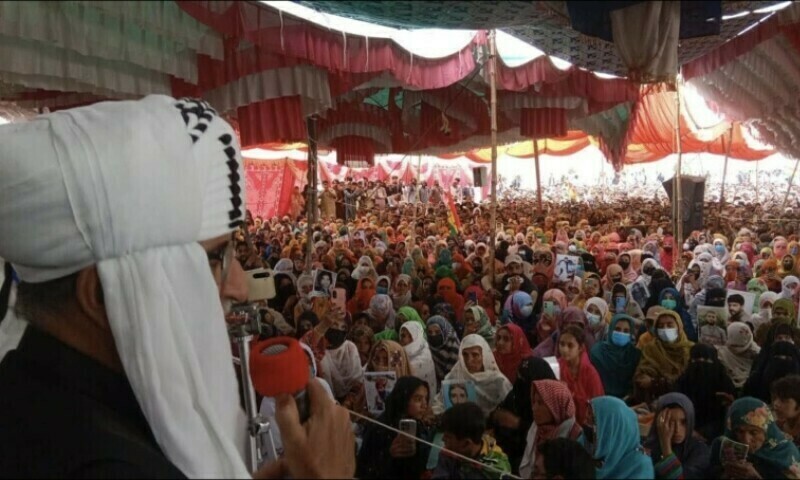

The ongoing road blockades have significantly disrupted trade, particularly with Iran and Afghanistan.
At a cave-side along the hazardous mountainous region of Chiltan, situated on the outskirts of Quetta near the Lakpass tunnel, dozens of policemen stand guard. A significant trade route, the tunnel connects Afghanistan with Karachi and Pakistan with Iran — but the highway has been blocked for weeks.
A protest organised by former chief minister Akhtar Mengal’s Balochistan National Party (BNP) has brought business and trade to a standstill in the province. The demonstrators are demanding the release of Baloch Yakjehti Committee (BYC) chief organiser Dr Mahrang Baloch and other female activists arrested last month.
The ongoing protests and road blockade have significantly disrupted local and international trade, particularly with Iran and Afghanistan. According to traders, more than 800 containers and bowser trucks carrying liquefied petroleum gas (LPG), along with multiple containers of perishable goods such as vegetables and fruits, are stranded at the crossing. The prolonged delays are resulting in substantial financial losses, especially from accrued duty taxes, and are undermining the Federal Board of Revenue’s (FBR) targets for Balochistan.
Meanwhile, the government and BNP have been laying the blame for this at each other’s door. Shahid Rind, the Balochistan government’s spokesman, earlier told Dawn that despite being offered an alternative venue — Shahwani Stadium in the Sariab Road area of Quetta — the BNP-M leadership has refused to end the blockade and continues their sit-in at Lakpass.
On the other hand, the party’s chief held the provincial government responsible for the highway blockades, saying the administration deliberately blocked the roads to prevent the long marchers from entering Quetta, which has forced them to continue their sit-in at Lakpass.
“This is the first government that has blocked highways for its people, denying them the right to travel,” he claimed.
imposing Section 144 in the city and resorting to tear gas. Ultimately, the BNP convoy camped at the Lakpass area of Mastung.
The long march was announced on March 25, days after the police crackdown on members of the BYC during a Quetta protest. The action drew widespread condemnation, with Amnesty International describing it as a systematic attack on Baloch rights activists.
What it also appears to have triggered is a comeback of Balochistan’s nationalist politicians onto the scene, the most prominent of them being Akhtar Mengal, who also recently distanced himself from Parliament. Announcing the long march, he said it was aimed at demanding the release of Baloch women and protesting “an attack on Baloch dignity”.
Mengal lamented that the government had arrested hundreds of his party members who participated in the protest, including minors. Due to the ongoing situation in the province, the BNP remained uncertain about participating in parliamentary politics in the near future, he added.
“It depends on the attitude of the state and the election process,” he told Dawn.com from the sit-in, adding that the state had pushed them towards the edge. “Yet, we remain committed to continuing our peaceful struggle.”
During the interview, the former chief minister expressed his desire for politics to evolve in a progressive direction. He acknowledged, however, that Baloch society remains deeply rooted in cultural norms, and women were not allowed to vote due to cultural rigidity.
Addressing a question regarding the “honour of Baloch women”, Mengal recalled how even Punjab Chief Minister Maryam Nawaz’s room being raided was widely condemned as a violation of a woman’s dignity. He pointed out the double standards: “When it happened to Maryam Nawaz, it was labeled as a violation of womanly honour.”
Mengal also condemned the arrest and alleged mistreatment of Dr Mahrang, stating, “The government is scared of her peaceful struggle for missing persons, and this fear led to her arrest and manhandling.”
When asked about the criticism surrounding the BNP’s long march, Mengal brushed off allegations about the move simply being a case of political opportunism. “If it were about opportunism, we could have gained political ground in many other ways,” he said.
losses of hundreds of thousands dollars for traders involved in the import and export business.
issued a joint declaration calling for the implementation of constitutional safeguards related to the 1948 Instrument of Accession of Balochistan to Pakistan and urging a national-level dialogue to resolve longstanding issues.
The leaders of political parties, during their speeches, said that adopting a “hard state policy” for resolving the issue of Balochistan would cause further unrest and worsen the situation. They said that the government should avoid adopting such a hard policy and resolve the issue of Balochistan by implementing the Constitution.
The conference was attended by leaders of Jamiat Ulema-i-Islam, both factions of National Party, Awami National Party, Jamaat-i-Islami, Pashtoon Tahaffuz Movement, National Democratic Movement, Majlis Wahdat-i-Muslimeen, JUI (Sherani faction), Balochistan Traders’ Association, Balochistan National Party (Awami), Jamhoori Watan Party, and various other political and tribal figures.
Speaking to Dawn.com, senior BNP leader Sana Ullah Baloch stated, “Our next course of action depends on how the government responds — and so far, its behaviour has been anti-people.” He further demanded the immediate release of activists arrested under the colonial-era Maintenance of Public Order (3MPO) law.
Header image: BNP-M chief Sardar Akhtar Mengal addresses demonstrators during a sit-in in Lakpass on April 2. — Photo via X (@sakhtarmengal)



